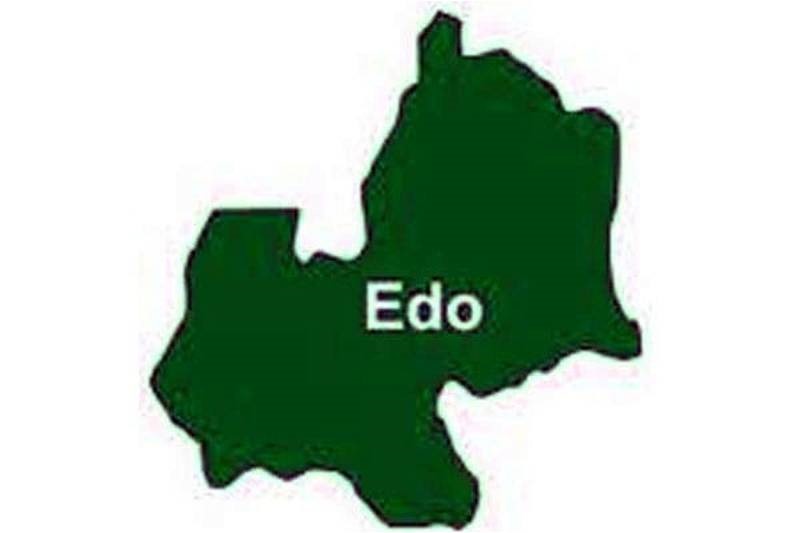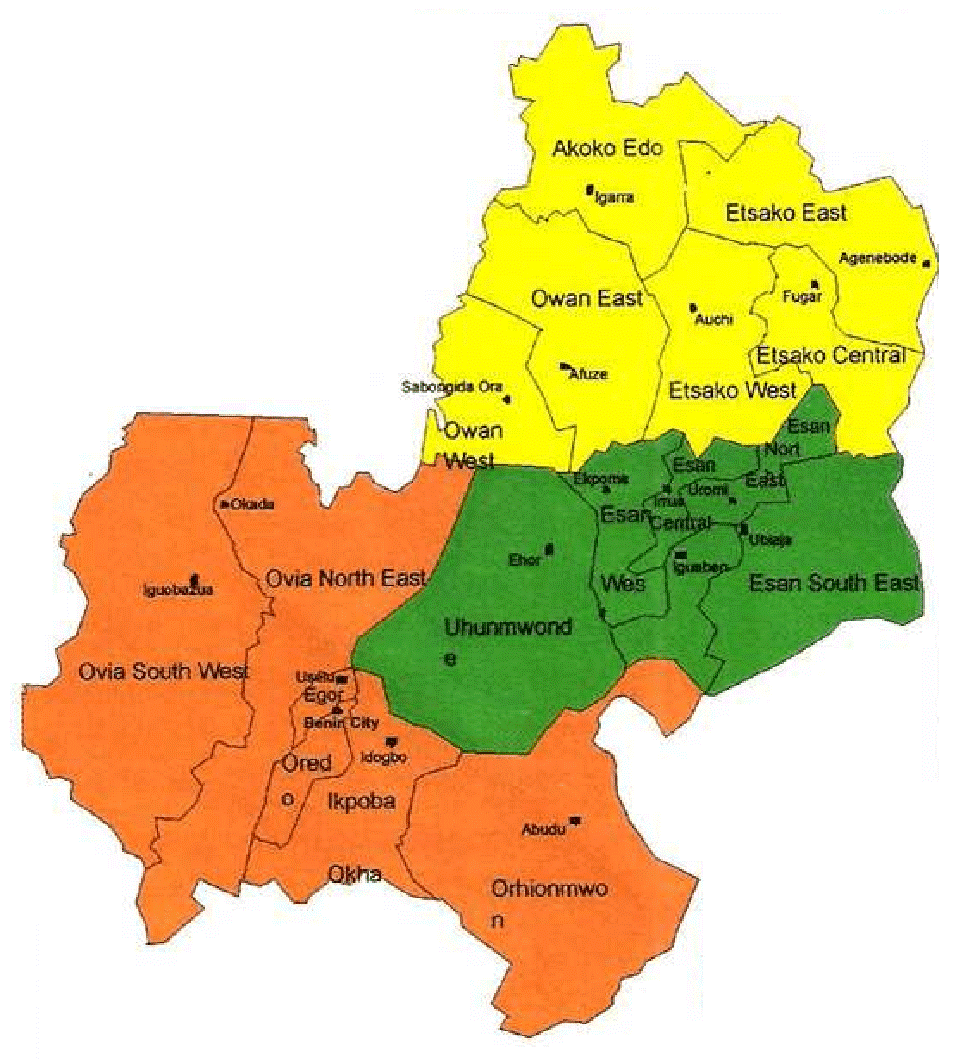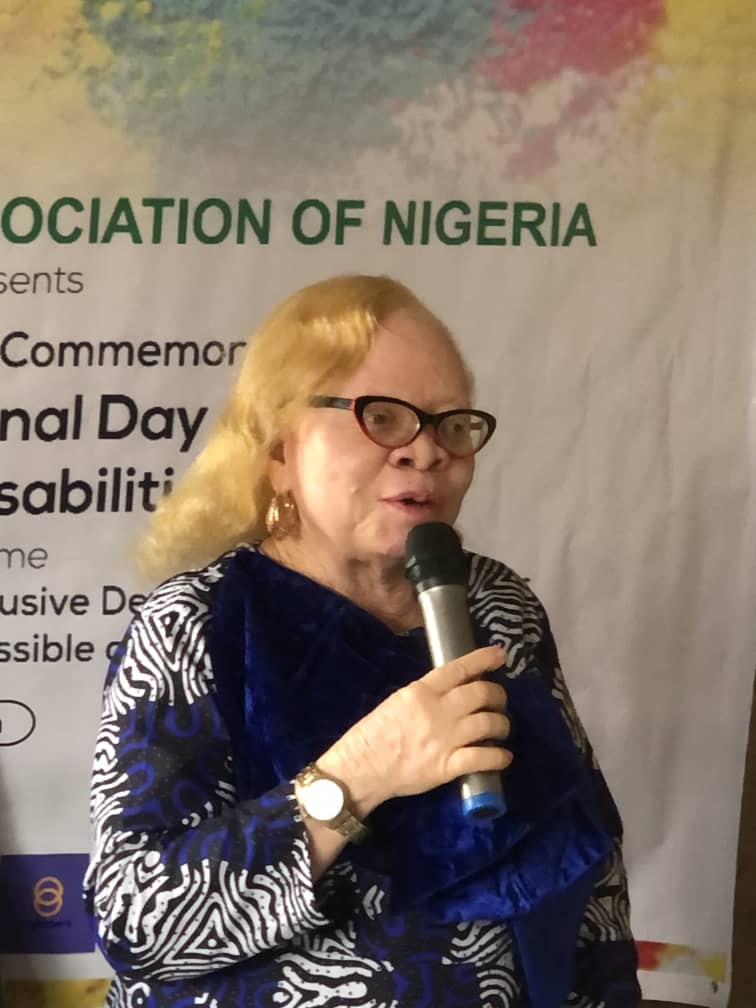One of the principles of the Universal Declaration on Human Rights (UDHR) is to have a world where no one is discriminated against on the basis of race, colour, skin or religion. The situation is, nonetheless, different in the world of Rita Osas*, a 40-year-old lady with albinism. Rita suffers perpetual discrimination due to her appearance.
Albinism is a genetic condition that causes little melanin pigmentation (colour) in skin, hair and eyes. Though albinism is just a mere genetic condition, Rita is unfortunate to grow up in a society where persons with albinism are treated with open disdain.
Rita’s experience is similar to many other persons with albinism in Nigeria, but to worsen the situation, she was born in Edo State, where some communities forbid her types from accessing the village as a result of the age-long traditional and religious belief against persons with albinism.

“I grew up to know that persons with albinism are abhorred in Igieduma community, Uhunmwonde Local Government Area (LGA) of Edo State and that some persons who worship the god of the community do not associate with persons with albinism even when they see them outside their community.
“My mother told me a story of how some people in this community told her to stop bringing me (then I was a child) to see her sister; they told her that persons with albinism are forbidden in the community,” Rita recounted her experience.
Recently, Rita was in a commercial bus in Ehor, a community in Uhunmwonde and a lady from Igieduma, refused to enter the same bus after catching a glimpse of Rita in the vehicle.
“She entered the bus, but alighted immediately she saw me sitting at the back seat of the vehicle and she started screaming and calling the name of her god that is believed to forbid persons with albinism and then, hurriedly walked away,” she said.
According to the World Health Organisation, albinism occurs in all racial and ethnic groups across the world; nevertheless, the proportion of people affected in a given population varies by region. For instance in Sub-Saharan Africa, the WHO report estimates persons with albinism vary from one in 5000 to one in 15000 people.
The prevalence of persons with albinism in Nigeria is ranked among the highest in the world, with an estimated figure of two million persons in the country. Studies reveal that children have a chance of being born with the condition if they have parents who carry the gene of albinism. However, this condition is neither a disease nor a contagious ailment
Rita’s experience explains the situation faced by several others living with such conditions in Edo State.
Sharing a close experience, Victoria Emeka*, 23, and another person with the skin condition, lamented the day she was evicted out of Obadan village, where she had gone for a church outreach.
“It is terrible that some communities in Uhunmwonde LGA of Edo State still hold strong negative traditions like forbidding persons with albinism in their communities.

“In 2022, my friend and I, also a person with albinism, joined other church members for an evangelism outreach in Obadan and two other communities close to Igieduma in Uhunmwonde.
“On getting to the first community, a man came to ask me if I was a foreigner, I told him no, he then asked me to leave the community that persons with albinism were not allowed to enter the community.
“I told him that I was in the community to preach God’s word, and he responded by saying that I should leave before something strange happens to me. I wasn’t scared of him because I had a revelation the previous day that I was going to come across a man that would confront me.
“I didn’t listen to the man, my friend and I joined others to move inside the community. I observed that some people in the community were running away from us. One woman pleaded with me to leave the community immediately, saying that her daughter with albinism doesn’t live with her in the community.
“I walked to a woman, frying garri with her child, I went close to her but she went backward, urging me to leave her presence. She started calling the names of her god to save her and also saying god forbid! I ignored her and told her that I was there to share God’s word and that she shouldn’t be bothered about my skin colour”.
“When we were leaving the community, I saw the same man that asked if I was a foreigner doing some incantations and I wasn’t bothered about what he was doing.
“My friend and I also had the same experience in the other communities we visited for evangelism. It was so barbaric. Communities need awareness about albinism and the need to allow persons with albinism to do things freely in their communities,” said Victoria.
This story, she said, was different from several other forms of discrimination that persons with albinism suffer in markets and schools amongst other public places in the state.
People with albinism face multiple forms of discrimination worldwide. Albinism is still profoundly misunderstood, socially and medically. The physical appearance of persons with albinism is often the object of erroneous beliefs and myths influenced by superstition, which foster their marginalization and social exclusion. This leads to various forms of stigma and discrimination.
In some communities, erroneous beliefs and myths, heavily influenced by superstition, put the security and lives of persons with albinism at constant risk. These beliefs and myths are centuries old and are present in religious, cultural attitudes and practices around the world.
According to the United Nations, the figures on violations against persons with albinism are telling. There have been hundreds of cases of attacks and killings of persons with albinism reported in 28 countries in Sub-Saharan Africa in the past decade.
The attacks have several root causes including long-standing stigma, ignorance, poverty and most abhorrent, harmful practices emanating from manifestation of beliefs in witchcraft. The alarming reality is that these horrendous practices continue today.
However, there is no real data on the discrimination of persons with albinism and the only data available from a credible source is that of albinism patients’ access to the health sector.
Regrettably, a traditional chief in Igieduma, one of the communities known to abhor albinism in Edo State, Chief Christopher Osayuwu did not see the traditional practice as a violation to the right to life, movement, association and assembly of persons with albinism in the country in spite of the explicit stance of the 1999 Nigerian constitution.
Osayuwu, who is the Ihama of Igieduma said their god named ‘Ovator” forbids ‘albino’, a term perceived by some people with albinism as derogatory.
“Igieduma is a community that is distinct, the community has been in existence since years immemorial and in every community, you must obey the dos and don’ts of the community.
“The god of the land (Ovator) forbids the albino, so that is why, even me, a confirmed chief in the community, even if, god forbid, I happen to have a relationship with an albino, that albino cannot enter my community.
“I attended Igieduma Secondary school in the 1970s and we had two albinos in the school, it was a boarding school and the albinos were staying in the hostel, they were from another community, outside Uhunmwonde.
“But those of us who were indigenes of Igieduma did not have a say over their stay in the hostel because we were lucky to be admitted into the school as gaining admission into secondary schools was difficult those days.
“We attend the same school, we may be in the same class, but we do not shake hands with the albinos, we distanced ourselves from them because we already heard that the god of the land forbids albino. Ovator forbids it; albinos do not enter Igieduma.
“There was an incident when we had shortage of water in the school, the principal knew quite well that the albinos do not need to come out from the hostel, but because of the water problem, they joined their mates to scout for water in the community, when the villagers saw them, they raised an alarm, see enemies! See enemies!! So when they got back to school, the principal invited their parents and the students were relocated out from the community,” he related.
The chief also narrated a recent incident where a person with albinism, who was part of a political campaign train, was forced to remain in a car without joining others to take part in the campaign in Igieduma community.
“Some people do not know that Igieduma forbids albino. An albino man was part of some persons who came to campaign in the community. He came down from the vehicle, immediately he was sighted by some people in the community, he was told to quickly hide inside in the car; and was told that albino is forbidden in the community.
He ran into the vehicle and hid himself there, so you see the embarrassment, the person is not given the right to go along with the other people. It is not our fault; it is what we met on the ground.
“From generation to generation, nobody in the community dares give birth to an albino, if anyone in the community dares give birth to an albino, the albino child will not survive the first week of birth. It is not something that can be reversed back. It is not our making.”
“Even the government cannot change it. If an albino forcefully enters the community, it is the dead body that they will remove. It is a crime to kill, but if an albino enters the community, and he is being told that the community forbids it, and the person refuses to leave the community, the person only went there to get what he or she needed; death is the answer,” he said.
He said overtime the tradition could not be changed, and refused to evolve positively saying “they cannot appease the god, it has been there, we are the upcoming generation, we met the system on ground, and it is being followed suit.
The chief noted, however, that the community was receptive to white persons but not persons with albinism, saying, “I can have a handshake with white persons but not persons with albinism”.
“We can talk to persons with albinism outside our community but not at a close range, we have to distance ourselves from them. We can’t sit with them in the same seat. We associate with them, but with a comma, we can’t eat food from the same plate together.
“If I associate with them at a close range, it will affect me, because I know that my tradition forbids them”.
Stakeholders react
Reacting, Mrs Bisi Bamishe, President, Albinism Association of Nigeria, condemned the act of rejection and discrimination against persons with albinism in some communities in Edo State.
“The news that persons with albinism are forbidden in some communities in Nigeria is sad. It is a surprise to hear that such exists in modern day.
“It is unfortunate that the physical appearance of people with albinism is an object of erroneous beliefs and myths influenced by superstition, in these communities.
“This is a violation of human rights – discrimination against the rights to live! We do hear about killings of people with albinism in other countries, most especially in Malawi, Mozambique, Kenya, Tanzania, among others but not here.
“It is unimaginable to think such is happening in our own country. It reminded me of the killing of twins in Calabar in those days. This act must stop.

According to her, “‘Persons with albinism are not evil. Albinism is not a curse. People with albinism are just like anyone else, with the same lifespan and ability to reach their goals.
“People need to know that albinism is a rare genetic disorder where a baby is born without the usual amount of melanin pigment, which is a chemical in the body that determines the colour of the skin, hair and eyes.
“To give birth to a child with albinism, means that both the father and mother have the gene. Babies should not be killed because of their colour. God created them like that.
“lt is against the law to discriminate, segregate or stigmatise against persons with albinism. Both the United Nations and Nigeria’s laws forbid discrimination.
“The Human Rights Council says that everyone has the right to life, liberty and security of person and that no one shall be subjected to torture or to cruel, inhuman or degrading treatment or punishment.
“In 2019, the National Policy on Albinism was established for persons with albinism because their rights cannot be disregarded in any society. It is hoped that effective implementation of this policy and its guidelines will guarantee their rights to live and get improved conditions of life.
The association’s President called on the attention of President Bola Ahmed Tinubu and that of the Governor of Edo State, Mr Godwin Obaseki, to stop this ungodly act.
“We appeal to them to save the lives of babies with albinism. They should be given equal opportunities to live like other babies. Adults with albinism should be allowed to live in their communities peacefully without fear’’, she appealed.
Similarly, Barrister Adams Aliu, a Constitutional lawyer in Edo State, said that “Nobody ought to be denied his right to freedom of expression, association, right to work and earn a living”.
Aliu said “Chapter four of the Nigerian Constitution, sub section 36 to 41, talks about fundamental human rights, irrespective of physical disabilities.
“The traditional belief that forbids persons with albinism from living in a particular community can be modified to suit the existence of human beings. They cannot be denied their rights; it is a violation of the fundamental human rights’’.
He advised the people in the community to temper justice with mercy and remember ‘force majeure’; which means unavoidable circumstances put persons with albinism in their condition.
“When they see force majeure, they should examine their case with mercy. Nobody constitutionally should be denied his or her fundamental human rights. Right to existence, association, and so on.
“They being persons with albinism is because of force majeure. Their albinism is not by their own fault or carelessness.
Aliu, who is also a Notary Public of Nigeria, said that perpetrators of such inhuman practices could be sued and served an order of mandamus. “The person can file for an order of mandamus, meaning, compelling the person in authority to do the needful’’.
According to Olumide Dosumu, Edo State Coordinator, National Human Rights Commission, “Every Nigerian has the right to movement and reside in any part of the country as such the community is violating their rights by denying them access into the community.
“Well as the lead agency in Nigeria with the mandate to protect, promote and enforce fundamental human rights and freedoms of the citizens, the actions of the communities are in violation of the rights of the person’s with albinism as provided in Chapter 4 of the constitution of the Federal Republic of Nigeria 1999(as amended).
“Such Rights include freedom of movement, right against discrimination in sections 41 & 42 of the constitution.
He said “Leadership of the communities needs to be educated on the provisions of the constitution and whatever traditional beliefs which are inconsistent with the constitution and repugnant to natural justice are null and void.
“Every Nigerian has the right to freedom from discrimination based on their sex, religion, ethnicity and colour etc.
“Also, Nigeria is a signatory to the African Charter on Human and People’s Rights, a regional human rights instrument which has provisions for all these rights”, the human right coordinator said.
On her part, Barr Agatha Osieke, Executive Director, Women, Youths and Children Advancement Programme, a grassroots Civil Society Organisation in Edo State, noted that her organisation would organise advocacy visits to prominent Benin traditional rulers as well as begin a sensitization of the public on protection of human rights.
Osieke said “hearing such information that persons with albinism are forbidden from entering some communities in Edo State is shocking. We are going to start serious advocacy visits to prominent traditional leaders. We will draw out our action plan which will involve advocacies and sensitization programs.
“It is a violation of their fundamental human rights and the tradition is repugnant to national justice, so after the advocacy to prominent traditional leaders in Benin Kingdom, we will then embark on visits to the communities where such traditions are still practiced.
“We are going to engage the media seriously for sensitization; we are going to involve the state government and the Ministry of Social Development and Humanitarian Affairs. Most people are not aware that such practice still exists and since we have come to know of it, we will not let it lie low.
“We will ensure that every person that needs to be involved in this is carried along. If other traditions are being thrown away, should this tradition still be practiced?
But before all these calls to action are answered by the various stakeholders, it has become imperative that every Nigerian owes a duty of care to those living with albinism, injury to one is injury to all they say.
Editor’s note: the names in asterisk are not the real names of the respondents, for the purpose of protecting their identities.
This story was produced with the support of the International Center for Journalists (ICFJ), in partnership with Code for Africa.

